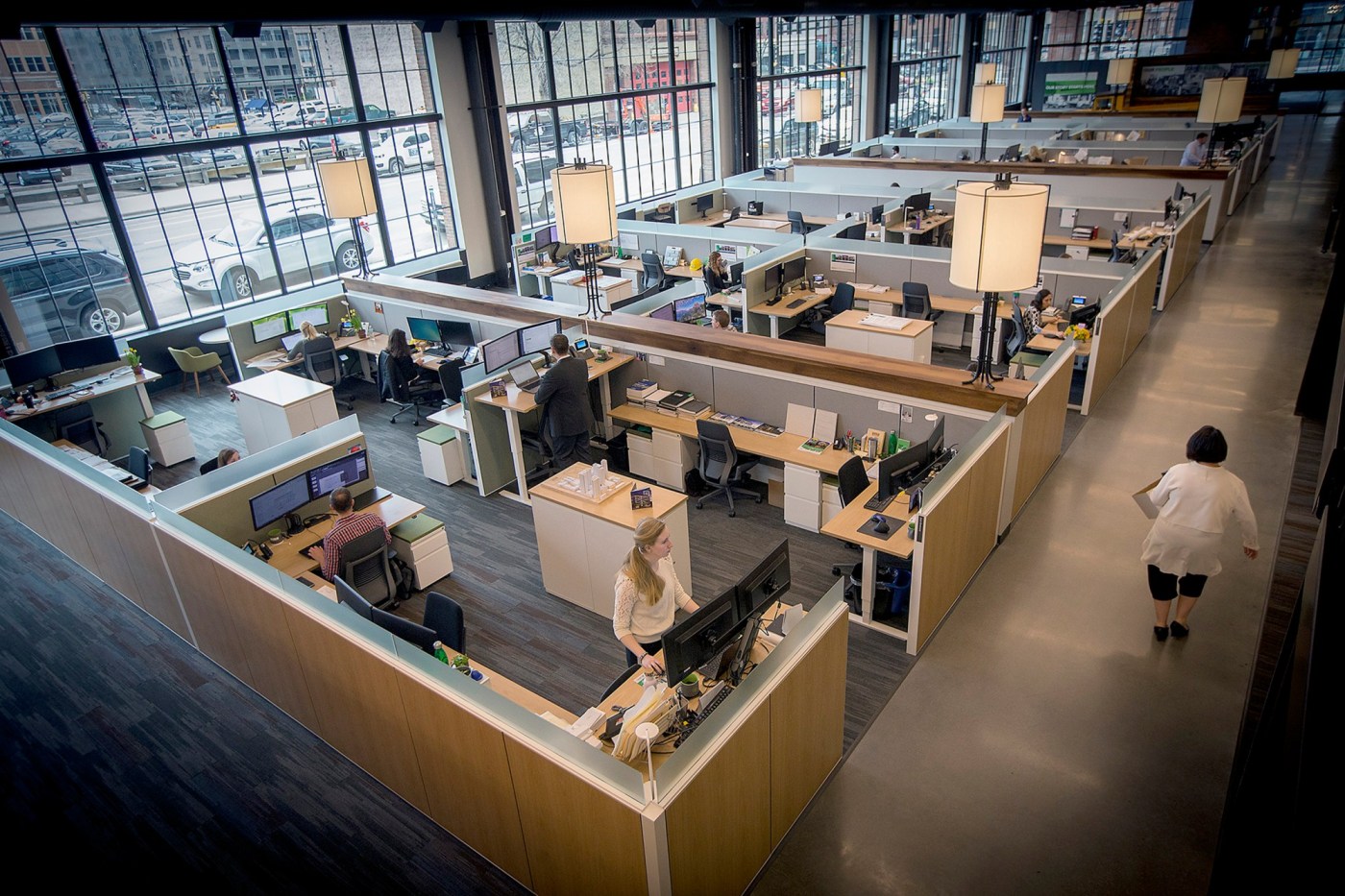
Bye-bye cubicles and corner offices: Reserving a desk for the day is new work trend
Dee DePass | (TNS) Star Tribune
Six weeks ago, the public relations firm Bellmont Partners reopened its renovated Edina, Minnesota, office with a catch: Not every employee would have a permanent desk.
Like an increasing number of employers wrestling with work-from-home trends, Bellmont adopted a musical-chairs-like seating system, albeit more high-tech, commonly called “hoteling.” Only 12 of Bellmont’s office workers have an assigned desk. Fifteen others who work mostly from home now use a new software app to reserve a desk for a day whenever they come into the office, which Bellmont requires only one day a week.
A little more than a month under the new system, and with a few tweaks, it’s been working, said Bellmont Partners co-owner Brian Bellmont. Making such a drastic change to the typical office setup, though, took a lot of preparation, including hiring a design consultant, polling staffers about their needs, tearing down walls and weighing various technology options.
More companies are considering switching to a hotel-desk model as they wrestle with hybrid work trends that lead to near-empty offices, wasted space and costly leases. Beyond Bellmont, local companies like law firm Maslon LLP and divisions within Thrivent, Thomson Reuters, Ameriprise and U.S. Bank are among those giving the reserve-a-desk concept a whirl.
Workplace experts caution that hoteling requires careful planning, and a botched transition can sink morale, produce angst and prompt costly turnover. To learn what helps and hurts when it comes to this new workplace trend, here’s what several experts have to say about best practices:
Because hoteling often involves space downsizing, packing up personal items and giving up individual turf, expect some backlash, experts warned.
“People don’t like change, so there will be resistance,” said Lisa Pool, a certified change leader and the workplace strategy leader at architecture and design firm Perkins&Will.
Workers will ask: “Where do I put my kid’s drawings? Or my partner’s picture? Or my favorite pen and pad?” That’s common, Pool said, because people enjoy personalizing their space and “like the predictability of sitting in the same place every day.”
Many employees worry hoteling means “they will spend all their time just trying to find a seat or trying to find their team,” Pool said. She added other concerns involve having to readjust workstations to certain ergonomic needs or individual preferences again and again. Desk hygiene and being stuck in a noisy or high-traffic area were other worries.
For all of those reasons, Pool said to “make sure you have a good variety of options for people to sit or work” and remember “to include them in the process.”
“Listen to them and understand their concerns,” Pool said. “If you just tell people that ‘You will do it!’ and you don’t tell them that it will benefit them, they will resist it. Help them imagine how they can work in the new environment and how they can be excited.”
Before any company tosses out all assigned desks, Bellmont said he would “really encourage leadership to listen to their teams” to understand what’s important to creating a productive and happy work environment.
Based on staff feedback, Bellmont didn’t just remodel. It also hired cleaners to disinfect the newly shared desks each night to ward off colds, crumbs and dirt. Some new additions included cubbyholes for each employee — so no one had to drag home their coffee mug, family photo or ergonomic keyboard each night — small conference rooms workers can reserve and private phone rooms.
“It’s a different model to get used to, certainly. And we totally get that,” Bellmont said.
Pool and human resource experts suggested company managers showcase the positives of not having an assigned seat. Employees can now easily change seats as they work on different projects and with different people, for example.
No one will feel permanently stuck at that desk by the freezing freight elevator shaft or bustling coffee klatch. And anyone needing a “heads-down” quiet day can book a secluded spot. Hoteling can also help office managers control their environments and make hybrid work spaces seem more vibrant and populated by having in-person staffers congregate around each other, Pool said.
“I have worked with companies who, before the pandemic, never would have considered it. Now they are like, ‘Yeah. Got to do it,’” she said. “If you have 400 people, but only 60 are coming in, optimizing office usage through hoteling is about creating energy and vitality and having people feel that energy in the space.”
At the Minneapolis-based developer Ryan Cos., “a lot of clients are looking at different ways to structure the workforce, and hoteling is clearly one of them,” said Ryan’s North Region President Tony Barranco. He said almost every company he’s worked with “is reimagining just how big they need to be and what space they should have.”
He added talking to those pioneering firms that already took the journey can provide useful tips and expertise.
Maslon partner and real estate attorney Jon Septer strongly recommended that office managers hire office architects and project managers with past experience guiding other clients through the change.
Maslon experimented with hoteling for the first time in January after downsizing and moving from a 50,000-square-foot office in Wells Fargo Center to about 35,000 square feet in Capella Tower in downtown Minneapolis.
At first, the idea of sharing desks and offices was a bizarre choice for a law firm, because most new attorneys expect a fancy personal office when they join a firm. It’s just part of the culture, Septer said. But the experts at Perkins&Will as well as a separate project-management firm surveyed Maslon’s partners about how often they actually came into the office and ultimately persuaded the firm to give it a try.
Still, Maslon treaded lightly, setting aside just seven hoteling offices for partners. It wasn’t enough. In the end, 17 people — 13 partners and four paralegals — opted for the flex desks. Now Maslon is leasing additional space to build 10 more hoteling offices and several more permanent offices for partners. Because planning for the move started during the pandemic, Maslon “had a hard time guessing” how much space to allocate to a floating-desk setup, Septer said.
Septer also suggested that other firms make sure their tenant leases include an option to add adjacent office space if hoteling doesn’t work and the business winds up needing permanent desks after all. Invest in personal lockers for employees and easy-to-use software, like the Zoom reservation system Maslon adopted.
“Those things really eased the transition,” Septer said.
Lastly, he advised companies to allow ample time to see if downsizing and hoteling are “really a good fit for us or do we really need to expand?”
“I really think this is a really tricky time for any company to be determining exactly how much space they need,” Septer said.
Barranco at Ryan also suggested companies be patient. Whatever hoteling planners are doing now, “expect it to change again,” Barranco said.
“People are going to need to be flexible and not be worried about making mistakes because the things that will change and happen are things that we are not even aware of,” Barranco said. “The pace at which the workplace and technology is evolving [is swift].”
The hoteling technology Bellmont chose was a big part of making the office transition work, said Account Strategies Director Katie Fitzpatrick.
“We have this Kadence app, and that has been an awesome tool. It provides a map of the office and lets you see where there is an open space, and who will be where,” she said. “If you want to be near a colleague who is working on a project you are working on, you can book that seat. And you can book it for a full day or in increments.”
The app-based system sends workers daily reminders about which desk they reserved on which days. Workers “check in” using the Kadence app each morning.
Fitzpatrick found she liked its flexibility. One day, she booked a desk near the kitchen and found it loud. Another day, she unknowingly booked a desk under the air-conditioning vent. Kadence let her change desks “on the spot.”
Andrew Fritz, whom Bellmont hired to help its redesign, used training videos so employees could easily learn the app.
Similar workplace management software — such as OfficeRnD, Skedda, EnvoyDesks, EMS Desk Booking and Tango — lets workers not only reserve a desk but also report problems to managers. That feature comes in handy if a desk is missing a cable, has a wobbly leg or if a previous worker forgot an item there, Fritz said.
Bellmont likes how the shift to hoteling didn’t break the bank, either.
“Small businesses are going to find that it’s not as expensive to embrace this approach as they think it is,” Bellmont said.
He spent roughly $15,000 on his office renovation and desk reservation system, including $1,400 for each conference room camera system and roughly $1,100 for the Kadence software. So far, employees aren’t complaining.
“We got a strong indication from our team that everybody would love their own office,” Bellmont said. “But this seems like a good compromise.”
©2024 StarTribune. Visit at startribune.com. Distributed by Tribune Content Agency, LLC.


